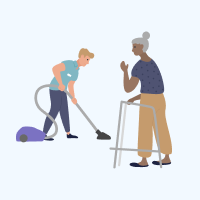Published date: 9 September 2024
There have been recent reports of scammers impersonating aged care providers. These scammers are targeting older people, their families and carers.
What is a scam?
A scam happens when someone tricks you into sharing personal or financial information so they can steal from you. Scammers are skilled at making their messages seem real. They often contact people unexpectedly, to make it harder for you to realise something isn't right.
It’s important to be cautious of unfamiliar emails, phone calls or texts. Even those that come from organisations you know and trust – such as your aged care provider.
How to protect yourself
You can protect yourself and your loved ones against scams by taking the following actions:
- Verify the caller or sender: Always make sure the person contacting you is who they say they are. Do this before you click on any links, share personal information or transfer money.
- Check with your provider: If you are unsure about something, call your aged care provider using the contact details on their official website
- Confirm account details: Before transferring any money, double-check account numbers with your provider. Again, make sure you use the contact details on their official website
- Trust your instincts: If something feels wrong, stop the transaction or conversation immediately.
What to do if you are scammed
If you think you’ve been scammed, you should act quickly. Contact your bank to stop the transaction and report the scam to your local police station.
You can also report scams to Scamwatch and ReportCyber.
More information
Learn more about identifying and reporting scams.
Last updated date: 6 December 2024



